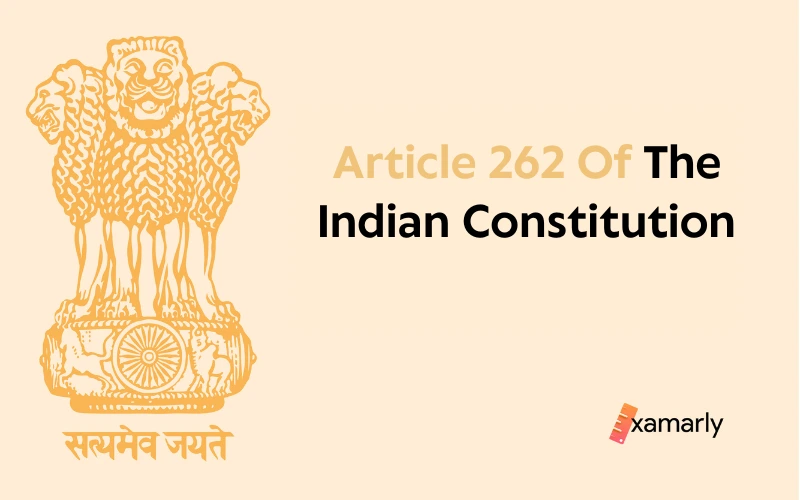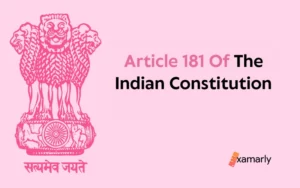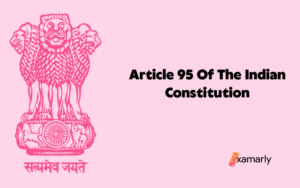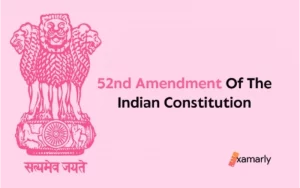India is home to a vast network of rivers, both small and large which are shared among several states. Disputes that arise between states in terms of the use of inter-State river or river valley waters need to be addressed quickly and properly.
Given its importance, the Constitution specifies elaborate procedures for adjudication of water disputes between different states under Article 262 of the Indian Constitution. This article provides for the establishment of a tribunal for adjudication of such disputes through negotiations between the concerned parties or by referring it for arbitration.
In this writing, we will look into some key aspects that have been incorporated in this important article to ensure fair and effective resolution among states in matters related to water resources.
What Is Article 262 of the Indian Constitution?
Article 262 of the Indian Constitution deals with the adjudication of disputes relating to waters of inter-State rivers or river valleys. The Constitutional provisions of the Article mentioned before are covered in the following two clauses:
- The usage, distribution, or control of any interstate river’s or river valley’s waters may be the subject of disputes or complaints, which Parliament may address by law.
- Despite anything in this Constitution, Parliament may pass legislation stating that no court, including the Supreme Court, has the authority to hear any dispute or complaint mentioned in clause (1).
Relatable article: State Some Economic Benefits Of Rivers And Lakes
When Was Article 262 Approved?
Draft Article 242A, also known as Article 262 of the Constitution of India 1950, was the subject of discussion on September 9, 1949. It addresses disagreements over interstate rivers and other river bodies.
In the Draft Constitution of India, 1948, this provision was absent. Initially, after receiving a complaint from a State, the draft Articles 239–241 allowed the President to form a commission to resolve disputes on interstate rivers. Instead of creating ad hoc bodies to address these problems, the Drafting Committee suggested including this Draft Article.
In accordance with the proposed Draft Article, the Union Parliament may decide on interstate water issues. Additionally, it gave the Union Parliament the authority to draft laws barring the Supreme Court from hearing these cases.
A member argued that the President, not the Union Parliament, should hold such authority. This suggestion was not discussed any further.
On September 9, 1949, Draft Article 242A was approved.
Acts Passed Under Article 262
In accordance with Article 262 of the Indian Constitution, Parliament passed the following Acts:
- River Board Act, 1956: With the help of the State Governments and under the authority of the River Board Act of 1956, the Central Government was given the authority to create boards for Interstate Rivers and river valleys. However, as of yet, there has been no board formed.
- Inter-State Water Dispute Act of 1956: If a State Government requests the establishment of a tribunal, the Central Government may do so after first making an effort to settle the conflict through consultations. It should be remembered that the Supreme Court may challenge the Tribunal’s operations but not the Award or methodology it has provided.
Article 262 Vs Article 131
The Supreme Court’s unique authority to resolve conflicts between States is addressed in Article 131 of the Constitution of India, however, this authority is not unrestricted.
If other constitutional provisions permit it, the supreme court may use its authority under Article 131 to resolve an interstate conflict.
The Supreme Court may not intervene in a dispute over interstate water conflicts, according to Article 262(2) of the Constitution, which authorizes Parliament to do so by law.
It denotes that the decision of the water tribunal, which was established by law to settle interstate water disputes, would be final and regarded as having the same weight as an order or decree from the Supreme Court.
The conclusion that can be drawn from this is that the jurisdiction of the Supreme Court is superseded by the decision that was handed down by the tribunal that was established as a result of the Inter-State Water Disputes Act of 1956.
Relatable Article: Advisory Jurisdiction Of Supreme Court
Winding UP
Article 262 gives Parliament the power to make laws providing for the adjudication of disputes or complaints relating to the use, distribution, or control of the waters of inter-State rivers or river valleys. It also allows Parliament to pass laws that exclude the jurisdiction of the Supreme Court or any other court over such disputes or complaints.
Article 262 is an important provision that helps to ensure that disputes involving the waters of inter-State rivers or river valleys are resolved in a fair and transparent manner and that the rights of the parties involved are protected. It is an essential part of the constitutional framework that governs the use, distribution, and control of such waters in India.
In the interest of further readings:
| Article 214 Of The Indian Constitution: High Court For States | Article 263 Of The Indian Constitution |
| Article 200 Of The Indian Constitution | First Session Of Indian National Congress |
FAQs on Article 262
Which provision of the constitution provides for the adjudication of disputes relating to waters of inter-state rivers?
Article 262 of the Indian Constitution is an important provision that deals with the adjudication of disputes relating to the waters of inter-State rivers or river valleys. It is an essential part of the constitutional framework that governs the use, distribution, and control of such waters in India.






